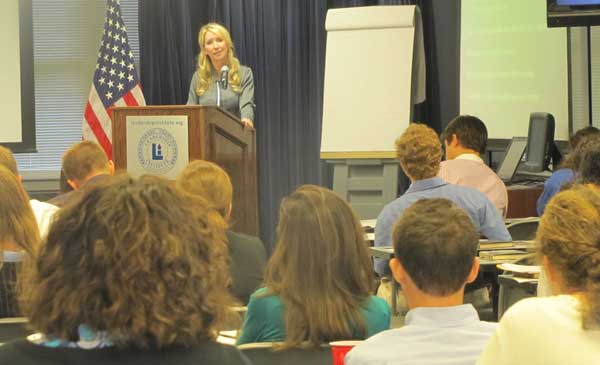Largest On Record: LI’s Written Communications Workshop Welcomes 114 Aspiring Communicators
 July 21, 2011, Arlington, VA—Efficient social media, impactful journalism, conservative media trends, and relevant Op-Eds, press releases, and media advisories are all essential aspects of effective communication. At this week’s largest-ever Leadership Institute Written Communications Workshop students learned how to acquire and apply these very tools in public policy.
July 21, 2011, Arlington, VA—Efficient social media, impactful journalism, conservative media trends, and relevant Op-Eds, press releases, and media advisories are all essential aspects of effective communication. At this week’s largest-ever Leadership Institute Written Communications Workshop students learned how to acquire and apply these very tools in public policy.LI welcomed more than 114 current and aspiring political writers who had the pleasure of learning from expert faculty such as Lindsey Mask, communications director for Congressman McKeon; Amanda Carpenter, senior communications advisor for Senator DeMint; American Conservative Union CPAC Director Christopher Malagisi; and others.
“LI provided me with training to improve my ability to communicate with our company leaders on a daily basis,” commented Scott McGeary, attorney and area manager at Washington Gas.
Former LI staffer and the Daily Caller’s Senior Contributor Matt Lewis spoke on the conservative media landscape and current trends.
“Everyone has an opinion; everybody owns a megaphone and a ‘printing press’. You are competing against all who can press ‘print now,” Lewis said, referring to the waning practice of blogging and the movement from strictly opinion pieces to both opinion and fact-based writing. “People are looking for new information and substantial content: find your niche.”
Lewis also exhorted students to be relevant and timely. “Be accurate, fair, and credible—and get it done five minutes ago! Timeliness in writing is so important—three or four minutes often make the difference. Be fast, accurate, and beat the other guy to the punch, but never sacrifice accuracy for speed.”
Dan Graham, principle of Graham Associates, shared the importance of audience analysis, avoidance of logical errors in sentence structure, elimination of “deadwood” or ambivalent words, and comprehension and improvement of readability.
Dan shared hints for capturing and holding the audience’s attention: “The better you know someone, the better you can tell them what you do; present tense is conducive, as opposed to speculative future tense; when writing in the passive voice, you have readers guessing wrong.”
Christopher Malagisi, director of the Conservative Political Action Conference (CPAC) of the American Conservative Union, outlined the elements of an effective op-ed and Communications Director Lindsey Mask touched on the basic components and variance of successful press releases and media advisories.
“The best writers are those who niche themselves in one or two specific areas,” Chris said. “A lot of people in politics are generalists—what is one unique thing that can set you apart? You may want to weigh in on the national political environment, but you are an expert on what is going on in your community.”
Students enjoyed interacting with each other and faculty members, while gaining valuable insights into the current political writing scene. Areva Enrichment Services Project Assistant Jennifer Lundy described the training as “a great way to learn and network with fellow conservatives.”
Intern Brianna Walden of the Family Research Council said, “Many concepts that I had floating around in my head were really defined and nailed down at this workshop. My biggest take-away: develop your own niche.”
Brianna summarized her experience: “The Leadership Institute offers thorough and enlightening training sessions and the Written Communications Workshop was no exception. I gained practical tools that will help me throughout life whether I enter a career in communications or not.”
She went onto conclude: “I am now better equipped to market myself online and have gained the tools to help my writing in everyday life.”
>
